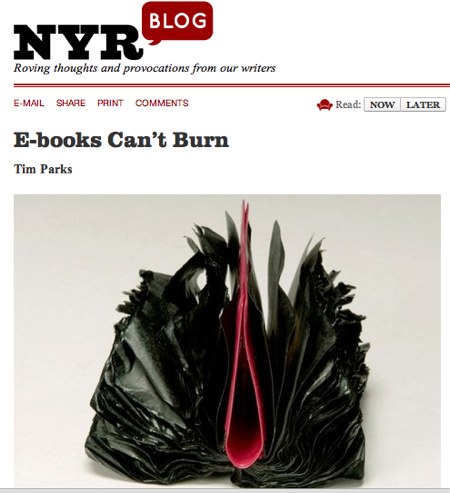E-Books Can’t Burn
Stacey Mason

Tim Parks argues for the merits of ebooks, noting that in addition to the fact that you can’t burn an ebook, they bring us closer to the essence of literature.
Literature is made up of words. They can be spoken or written. If spoken, volume and speed and accent can vary. If written, the words can appear in this or that type-face on any material, with any impagination. Joyce is as much Joyce in Baskerville as in Times New Roman. And we can read these words at any speed, interrupt our reading as frequently as we choose. Somebody who reads Ulysses in two weeks hasn’t read it any more or less than someone who reads it in three months, or three years.
Parks continues by drawing a correlation between the maturity of an audience and its appreciation for ebooks. They free us from the vanity and “fetishistic gratification” of showcasing what we’ve read on a bookshelf. They also eliminate the distraction of the material object, focusing our attention on the text itself.
In this sense the passage from paper to e-book is not unlike the moment when we passed from illustrated children’s books to the adult version of the page that is only text. This is a medium for grown-ups.
Parks has a point, but he does come off as a little condescending. Ebooks and tree-books both have benefits and drawbacks. They both offer certain comforts of permanence, one through physicality the other through ubiquitous distribution and ease of reproduction. Not to mention that the ebook still has a long way to go in terms of navigational ease, and in many cases even just quality of transcription.
And if the focus on the text is the virtuous, mature endeavor, on which aspects of the text should we focus when studying eLit, when the interface influences our interaction with the text more directly than the ebook’s?
